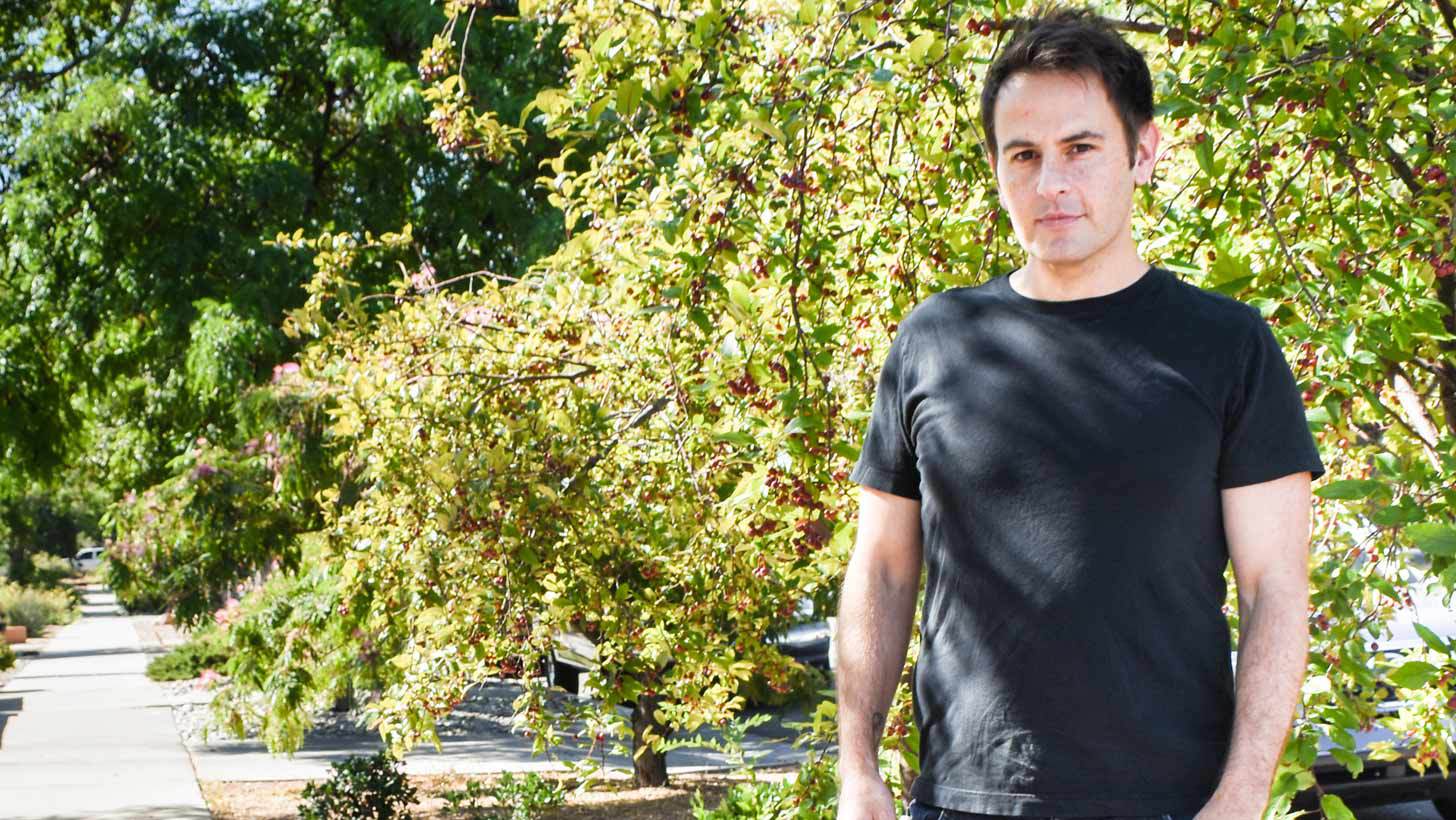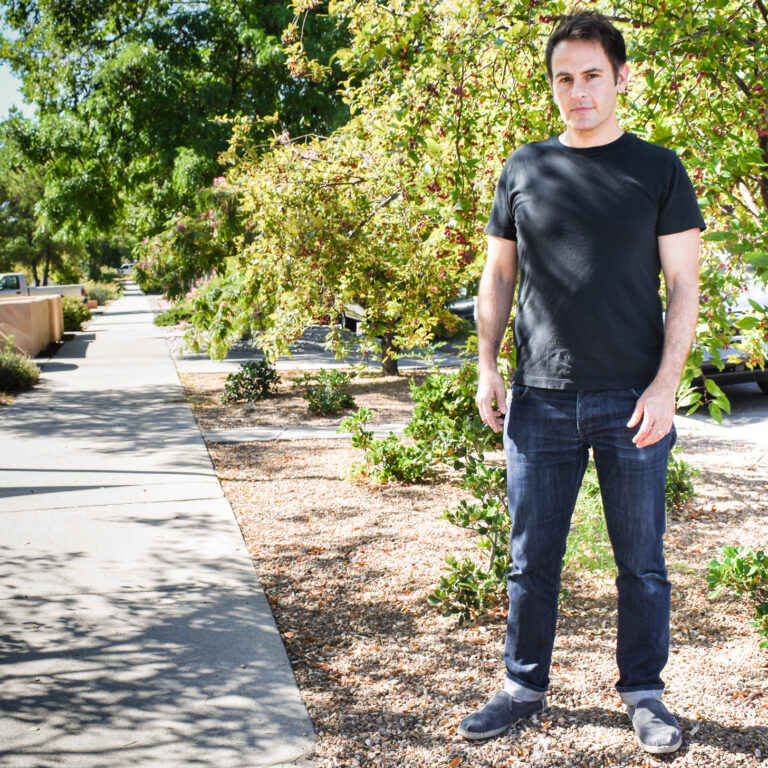Gregory Moss agrees that he should probably update the bio on his website. It currently says he “is a writer, educator and performer from Newburyport MA,” which is true, but it leaves out the fact that after living, writing and teaching here in Albuquerque for the past six years, he now considers himself a New Mexican playwright. With close to 20 plays to his name, he has had a successful career that has branched off in a number of directions. Several years ago, he began the epic task of creating a musical about the great writer Hunter S. Thompson. These kinds of projects take an enormous amount of time and resources to develop and bring to the stage. Karen is different.Karen is a play with five actors and limited hoopla. Moss put together the project as way to return to his playwriting and producing roots focused on telling a story in quick, compelling way he describes as “scrappy.” Karen opens this Thursday at Tricklock Performance Laboratory with Moss taking on both the writing and the directing roles. Weekly Alibi sat down with Gregory Moss to talk about Karen, Hunter S. Thompson and the changing ways he is trying to tell stories. The following is an edited version of that conversation.Weekly Alibi: What is so compelling about growing up in America? Gregory Moss: I think the reason a lot of my plays have taken that stance, and even with this play that I’m working on now, is that it’s trying to find a character who is new to the world. It’s trying to look at how America works, what the social rules are, what the political rules are and what the expectations are. By taking a teenager or taking a character who’s a little outside of that, you can observe it objectively and look at how bizarre the things that we take for granted as daily life in America. What are the rules of how genders interact? What are my expectations are towards work and money? Also, young people on stage are empathetic. We tend to, for whatever reason in this country, we identify with someone at the cusp of a change like coming into the world, coming into their adulthood. For me, in many ways it’s an opportunity to tell an empathetic story that also allows me to address social issues in usually a funny way, in a softball way. I’m not didactic but [I want] to show the absurdity of the world we have created for ourselves to some extent. Is Karen a departure? I think in terms of process it is. In some ways it’s the same. [Karen has] some of the same themes. Also, as a person in my forties, I’m coming to grips with certain questions that come with middle age. I find middle age is very much in some ways like adolescence. It’s like another forging of identity. What you’ve been, the way you have been is no longer working and you have to create a new identity for yourself. Karen in particular is a sort of everywoman outsider. Not an outsider, just someone who is—she’s the straight man to the play, to the world. The world is absurd around her and I think that’s a familiar thing from other parts of that work.Is Karen the vehicle for the other characters?It’s her journey for sure, but the other characters are vivid personifications of things that occur to someone in midlife in terms of—I didn’t do this. I didn’t take this path. I didn’t have this kind of relationship. I never had kids or whatever. The premise of the play is really that it’s this woman who, on the eve of her birthday, receives this call that sets her off on an adventure. The play takes place over the course of one night and it’s trying to imagine what a woman’s midlife crisis would be if it happened in 12 hours instead of over the course of three years. Some of your other work has involved pop culture heroes. Have we already established our pop culture hero canon or are we still developing new ones? That’s a really interesting question because I think the things you liked when you were 15 are the things that seem big to you still. I’m not so interested in heroes, but I’m interested in what people are putting on a pedestal. I think with the internet, it’s so fast at this point and I’m getting old. I’m not that interested in keeping up with that. Things come and go. It cycles through so quickly.Hank Williams isn’t going to change. We’re not making new ones of him. Right. And I love Hank Williams. Or Hunter.I’ve worked with 18-year-olds. They don’t know who Hank Williams is. Some of them know who Hunter Thompson is. I think that’s someone that is evergreen. I am interested in those figures you’re talking about for sure and interested in pop culture. I have a play called Punk Play that deals with that canon of punk rock heroes. It’s really a coming of age story, but there’s a lot of music and a lot of pop culture drawn from that subculture. In theater there’s a feeling of steering clear of pop culture, like we’re trying to create this sort of high drama, but I’m interested in mixing high and low things and involving pop culture when I do.Would you call these musicals?I would call them plays with songs. The Hunter Thompson thing is a real musical. It’s a full-blown Broadway style musical, which I’ve never written before. One of the reasons I’m doing this play with Tricklock is because the Hunter Thompson musical project has been like five years of work. I really wanted to make something that was fast and we could just do it. I wrote it in May and June, then got the cast together. It was a return to my roots of making theater on no budget, to scrappy self-producing. I wanted to do something that was fast and exciting. Do you think American theater is bifurcating? I think the bifurcation you’re talking about is just economic. People will produce things that you can sell for $150 a ticket and then will tour and be on Broadway. While I have a foot in the nonprofit, off-Broadway theater, I also want to keep this thing alive that I do for nothing. I think there has to be that balance for me personally. Economically, people are living in New York and creating small theaters. Albuquerque has something like 75 theater companies. It’s ridiculous. We do have an awful lot of theater companies.I think there’s also an impression that young people have that it costs a lot of money or you can’t do it on your own. I think you can and you’ve just got to find a space and be resourceful. How has it been working with Tricklock?I’ve been friends with Tricklock since I got here. A lot of my students have come from their company. They have an international theater festival which I was always really interested in. I was pretty hesitant to do work of my own in Albuquerque. I wanted to keep my life as a professor and my life as a writer separate, but at some point, it was just like, let’s just do something and let’s just make something. So, I came to Tricklock and they were incredibly receptive to the idea of co-producing something and doing it quickly. They gave me space and gave me actors. I think the kind of work I’m interested in making and the experiment that Karen is, is in their mission. It’s theatrical and it’s collaborative. There’s an element of artistic risk to it. They’ve been incredible actually. They’ve been really generous in terms of supporting this thing. How does directing your own work differ from handing it over to someone else? I think thats another reason I was doing this is because I have been just a writer and I came up as an actor/director/ writer/producer with a shoestring budget when I was living in Boston. That’s what I was doing before graduate school. So, as much as I love just writing and I love being able to collaborate with people in that way, I was also feeling like sometimes it’s like you’re handing off the moment. You stop having a voice in the room and that’s when you start to learn things. When the actors actually start getting on it, that’s when you actually see how the play works. I think there was a sense, again, as a person getting a little older, I wanted to be able to take responsibility for my work from inception to completion, even if it’s in a super scrappy way. I wanted to flex those muscles and see what that would be like, to not count on someone else to do that work for me. I think in the professional theater roles are very siloed. A playwright is a playwright and a director is a director. If you’re an esteemed playwright, you’ll get to direct your own stuff.I’ve gotten the impression from your plays that your characters all live in in the East. Now that you have been in New Mexico for six years, are you starting to envision characters that are from the Southwest?That’s weird. Yeah. I think a lot of my plays prior to the most recent are really set either in an imaginary version of Boston or Cambridge or where I grew up. This spring I wrote a play that takes place in the Truchas Mountains, so I think it’s starting to take root. It takes a little time, but the kind of people I’ve met here are very, very different from back East. Here is just a very colorful place that has a wide variety of types of people. I think I’m starting to, and I feel like New Mexico is deeply underrepresented in terms of the American theater scene. That’s part of my teaching at UNM. I’m trying to develop playwrights who will go out into the world and represent New Mexico. What else do you want people to know about Karen?It’s fun. It’s a funny play. Is it really a comedy?I would call it a comedy. It has some serious themes, but it’s mostly funny.People will laugh?I think it will be a good time. Yeah. I wouldn’t say it’s light, but it’s not tragic or anything. It moves through a lot of different genres and styles. It’s like 85 minutes. It’s fairly quick. It’s fun. It’s an adventure.
KarenTricklock Performance Laboratory110 Gold Ave. SWOpening Thursday,Sept. 19, 8pmTickets: $10










